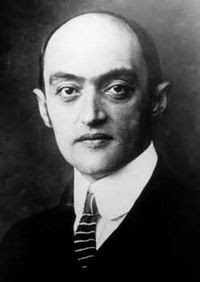 Joseph Alois Schumpeter (February 8, 1883 – January 8, 1950) was a Moravian born classical liberal economist and political scientist of the Austrian school of economics. He was one of the most influential economists of the 20th century.
Joseph Alois Schumpeter (February 8, 1883 – January 8, 1950) was a Moravian born classical liberal economist and political scientist of the Austrian school of economics. He was one of the most influential economists of the 20th century.
Undesirable Democracy
Schumpeter expounded a theory of democracy which sought to challenge what he called the 'classical doctrine'. He disputed the idea that democracy was a process by which the electorate identified the common good, and politicians carried this out for them. He argued this was unrealistic, and that people's ignorance and superficiality meant that in fact they were largely manipulated by politicians, who set the agenda. This made a 'rule by the people' concept both unlikely and undesirable.
Instead he advocated a minimalist model, much influenced by Max Weber, whereby democracy is the mechanism for competition between leaders, much like a market structure.
Although periodical votes from the general public legitimize governments and keep them accountable, the policy program is very much seen as their own and not that of the people, and the participatory role for individuals is severely limited.
Creative Destruction
The notion of creative destruction is found in the writings of Friedrich Nietzsche and in Werner Sombart's Krieg und Kapitalismus (War and Capitalism) (1913, p. 207) where he wrote: 'again out of destruction a new spirit of creativity arises'. The economist Joseph Schumpeter popularized in his work entitled "Capitalism, Socialism and Democracy" (1942) to denote a "process of industrial mutation that incessantly revolutionizes the economic structure from within, incessantly destroying the old one, incessantly creating a new one and used the term to describe the process of transformation that accompanies radical innovation.
Schumpeter goes so far as to say that the "process of creative destruction is the essential fact about capitalism."
Destroying Iraq
The step from economic destruction to military destruction is apparently small. Michael Ledeen, machiavellian fascist expert and neocon warmonger of the American Enterprise Institute writes;
"We therefore have a dual task: Kill the terrorists, and destroy the regimes that provide them with the critical infrastructure — training, safe havens, travel documents, technology, and all the rest — they need to operate.
The hunt for the terrorists is a technical matter, and we must hope that our military has enough virtue left from the Clinton ravages to do the job. But we should have no misgivings about our ability to destroy tyrannies. It is what we do best. It comes naturally to us, for we are the one truly revolutionary country in the world, as we have been for more than 200 years. Creative destruction is our middle name. We do it automatically, and that is precisely why the tyrants hate us, and are driven to attack us."
The fact that Saddam Hussein never attacked the US or had any connection to 9/11 seems to be irrelevant.
"The hidden agenda of the US government in Iraq has been three -- fold. Firstly, to take control of the world’s second largest oil reserves, thereby seizing one of the key oil spigots of competitors like Japan, China and the EU. Secondly, to prevent the dollar -- based world oil market from transacting in Euros, something Iran, Iraq and Venezuela were attempting since 2002, when the Euro was launched. Thirdly, the establishment of permanent US military bases in the strategic heart of the world. (The US has built the world’s largest embassy – employing 5000 people – in Baghdad).
In all three respects, the war has been a resounding success. US oil companies have taken charge of Iraqi oil. In the future it is through them that Japan, China, EU and any other competitors will have to buy oil from the region, something that gives the US formidable leverage. The oil market continues to transact in dollars, fragile as it is as a global reserve currency. Iranian experiments with the Euro Bourse have not taken off."
The European Union
The European Union's innovation program, and its main development plan, the Lisbon Strategy, are based on Schumpeter.
Austrian School of Economics
Classical liberalism
Creative Destruction
Joseph Schumpeter
The Economics of Creative Destruction - The Iraq War is a Huge Success
Joseph A. Schumpeter "Creative Destruction"From Capitalism, Socialism and Democracy
Michael Ledeen: Creative Destruction - How to wage a revolutionary war.
The new liberal imperialism
10 January 2008
Creative Destruction
på
13:14
![]()
Subscribe to:
Post Comments (Atom)

No comments:
Post a Comment